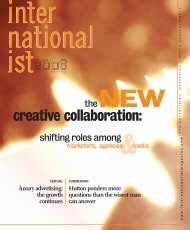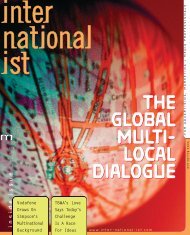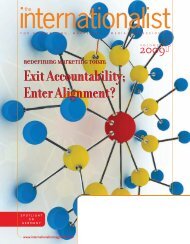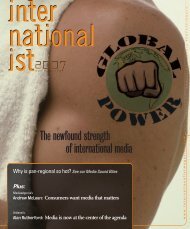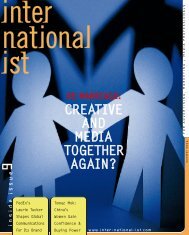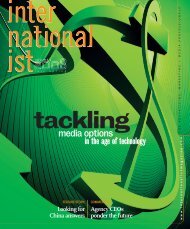2011 Issue 55 - Internationalist
2011 Issue 55 - Internationalist
2011 Issue 55 - Internationalist
You also want an ePaper? Increase the reach of your titles
YUMPU automatically turns print PDFs into web optimized ePapers that Google loves.
Cambridge Reseach illustrates:<br />
Olny srmat poelpe can raed this.<br />
I cdnuolt blveiee that I cluod aulaclty uesdnatnrd what I was rdanieg. The phaonmneal pweor<br />
of the hmuan mnid, aoccdrnig to a rscheearch at Cmabrigde Uinervtisy, it deosn't mttaer in what<br />
oredr the ltteers in a word are, the olny iprmoatnt tihng is that the first and last ltteer be in the rghit<br />
pclae. Amzanig huh?<br />
With 7 billion people on the planet, and 5 billion now<br />
connected by mobile phone (50% of whom can<br />
connect to the web without a land line, desktop or<br />
laptop), the first media is now people. There has<br />
never been a better time to be in the advertising and<br />
marketing communications business, because it<br />
exists in the idea exchange between people.<br />
More than ever, effective marketing is as much<br />
about listening well, as talking. Strategic message<br />
creation alone is insufficient. We must be attentive<br />
to the ever constant stream of messages created by<br />
individuals.<br />
Bill Bernbach said: “All of us who professionally use<br />
the mass media are the shapers of society. We can<br />
vulgarize that society. We can brutalize it. Or we can<br />
help lift it onto a higher level.”<br />
As people engage with advances in communications<br />
technology the advertising and marketing<br />
communications profession has greater value, but<br />
also increased accountability.<br />
I can think of no better place than the APIMA<br />
region (Asia Pacific India, Middle East and<br />
Africa), to examine language. This vast region,<br />
which covers the first 12 hours of the day, has<br />
more than 1,000 discrete languages and upwards of<br />
2,000 dialects. This region provides a perfect<br />
platform to examine communication in a diverse<br />
and rapidly changing, interconnected marketplace.<br />
For example, China has 17 language groups and 400<br />
dialects, all reportedly unintelligible from each<br />
other. India has over 30 languages and more than<br />
200 dialects.<br />
Advances in neuroscience are enabling us to look how<br />
the brain processes information, emotions, ideas and<br />
concepts. It is proving how no two people’s brains<br />
work the same. Each of us has is a unique processing<br />
capability based on many factors of experience and<br />
learning. One of the most dominating factors in how<br />
one processes ideas is the language you first learned<br />
between birth and five years old.<br />
The first language a person learns hard-wires their<br />
mind. This makes it critically important to know<br />
what language a person first learns and which<br />
language they process information in, to truly<br />
understand each other. It is like taking a British<br />
electrical plug with its distinctive three-pronged<br />
“The first language a person learns<br />
hard-wires their mind.”<br />
www.internationalistmagazine.com<br />
37



